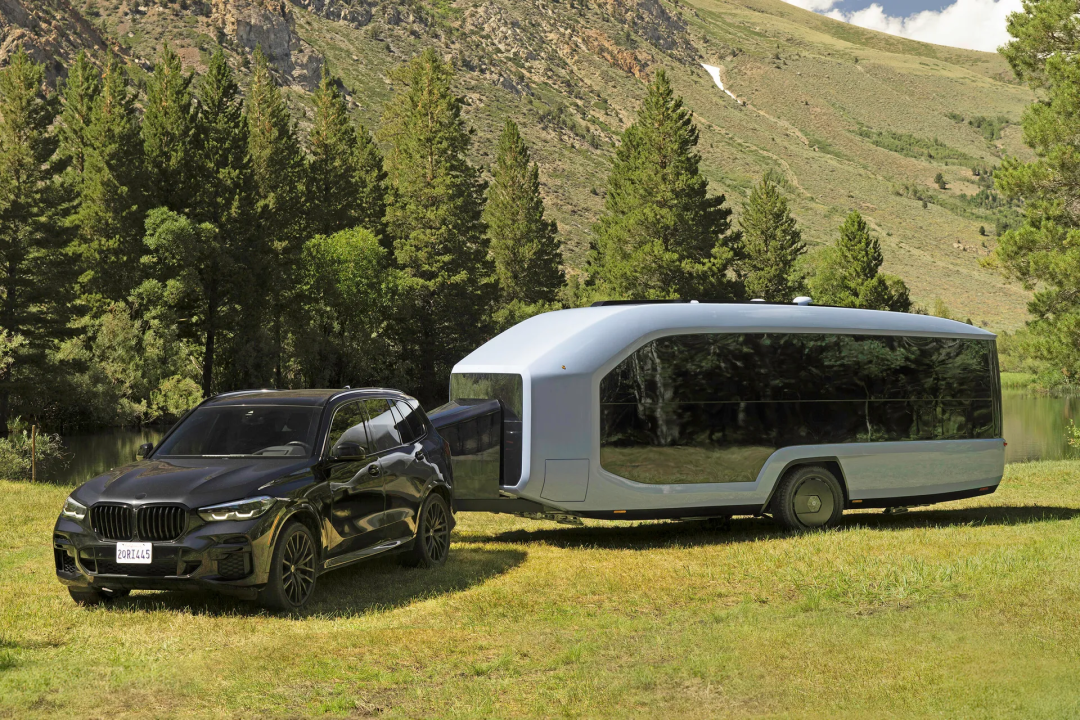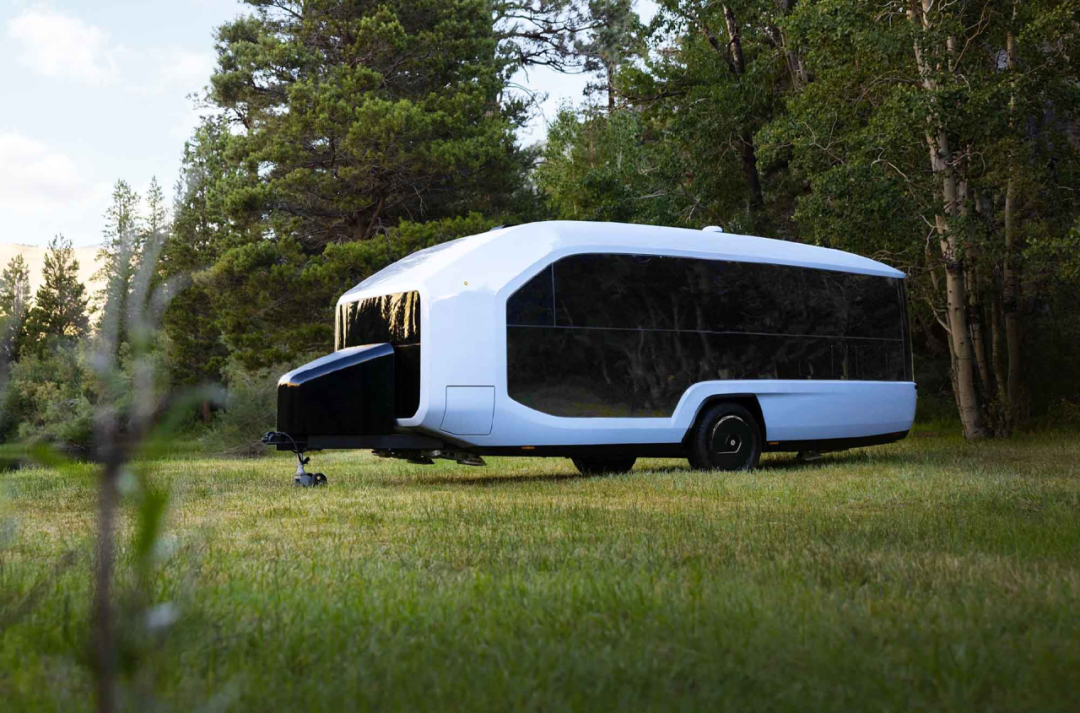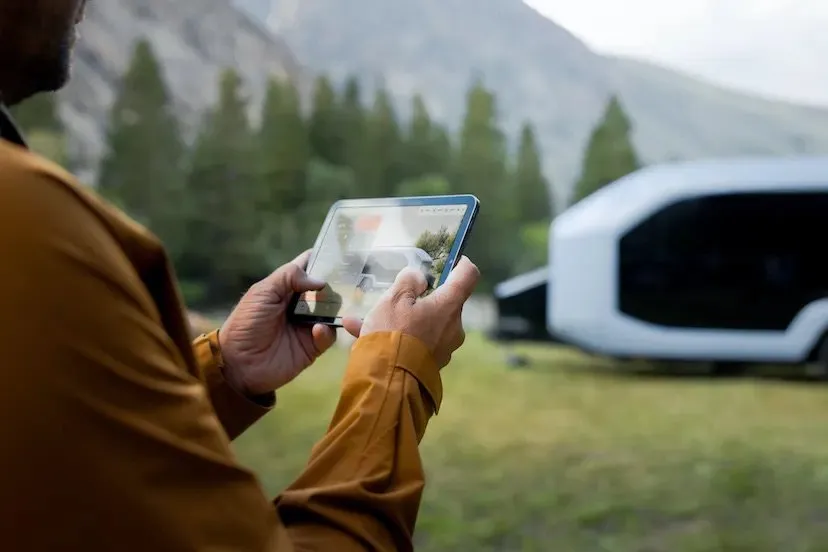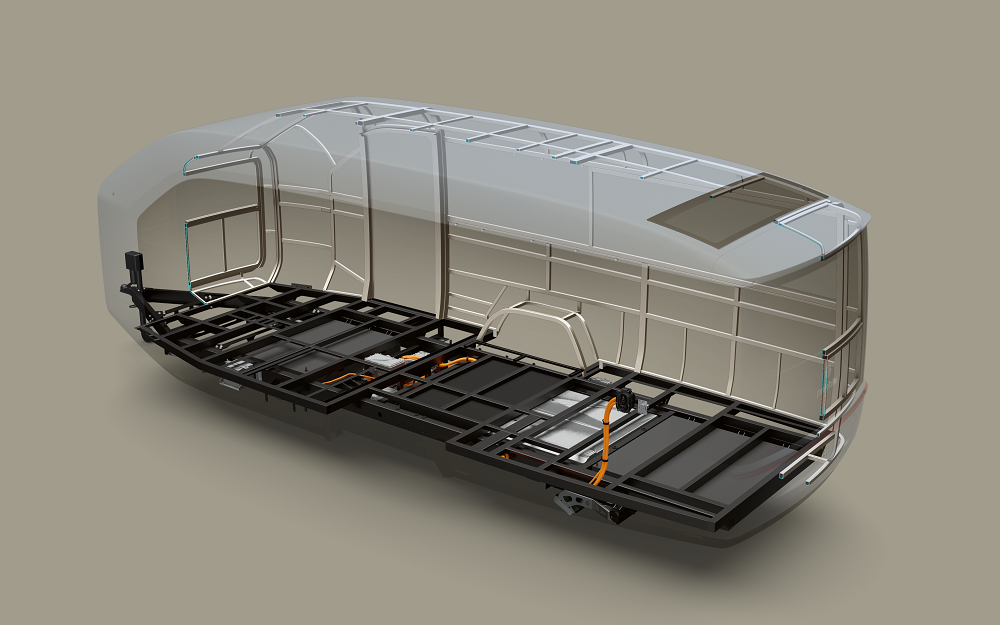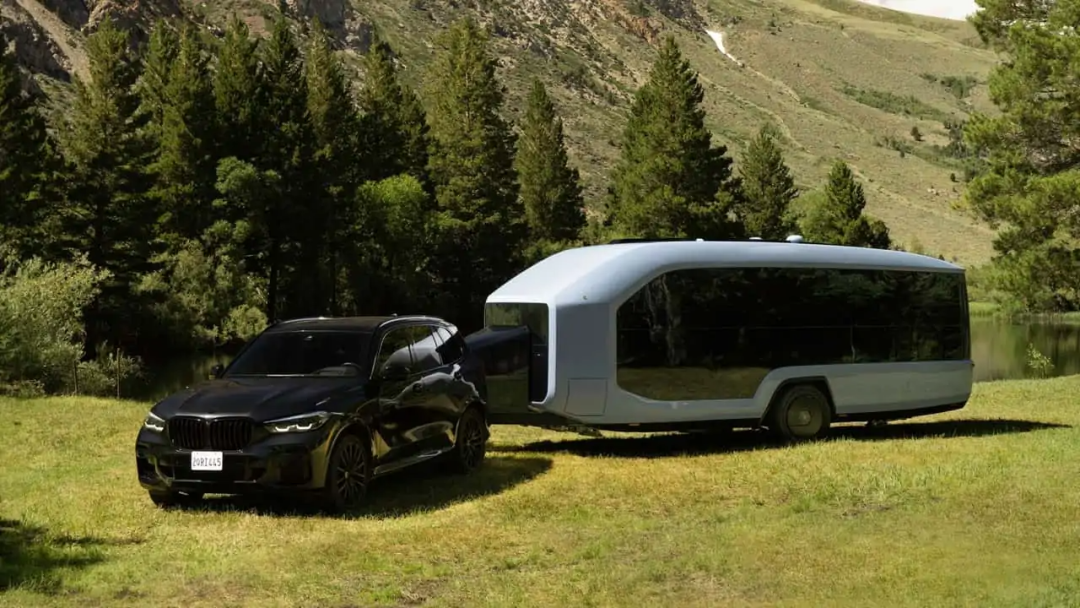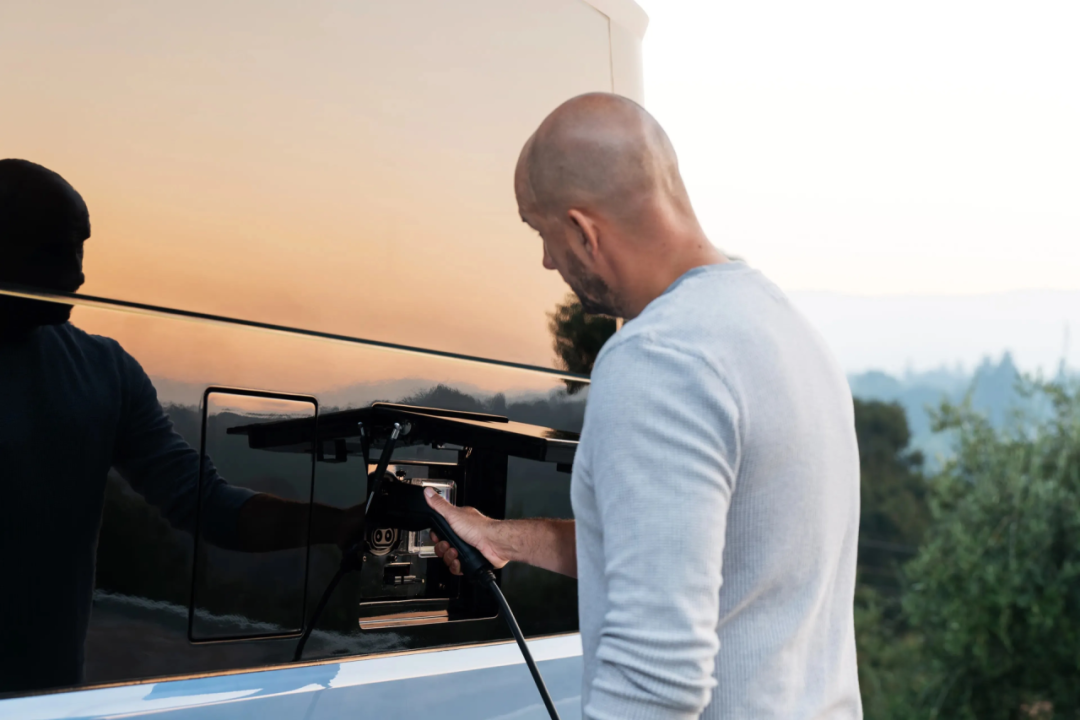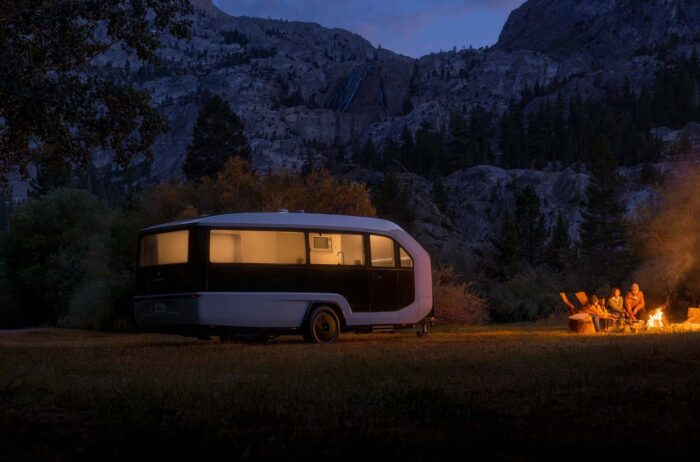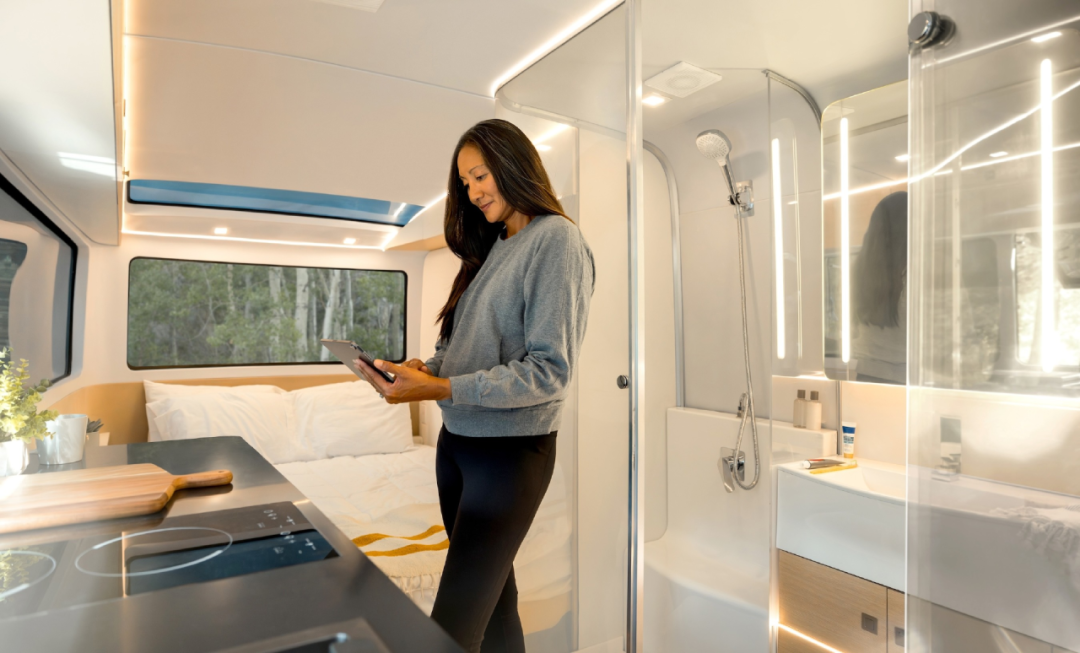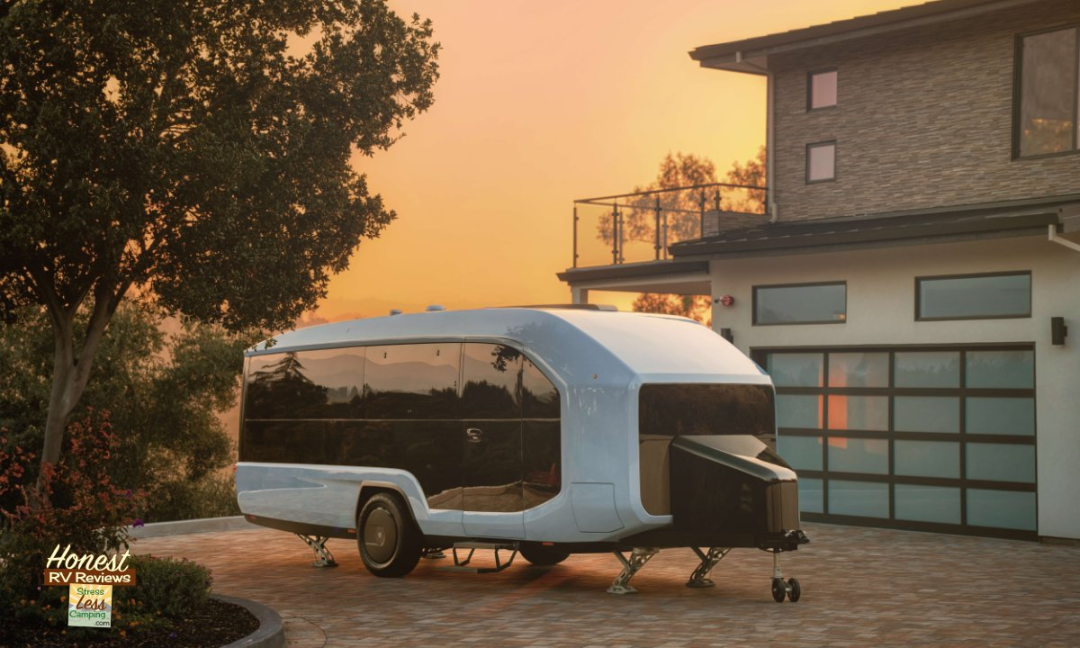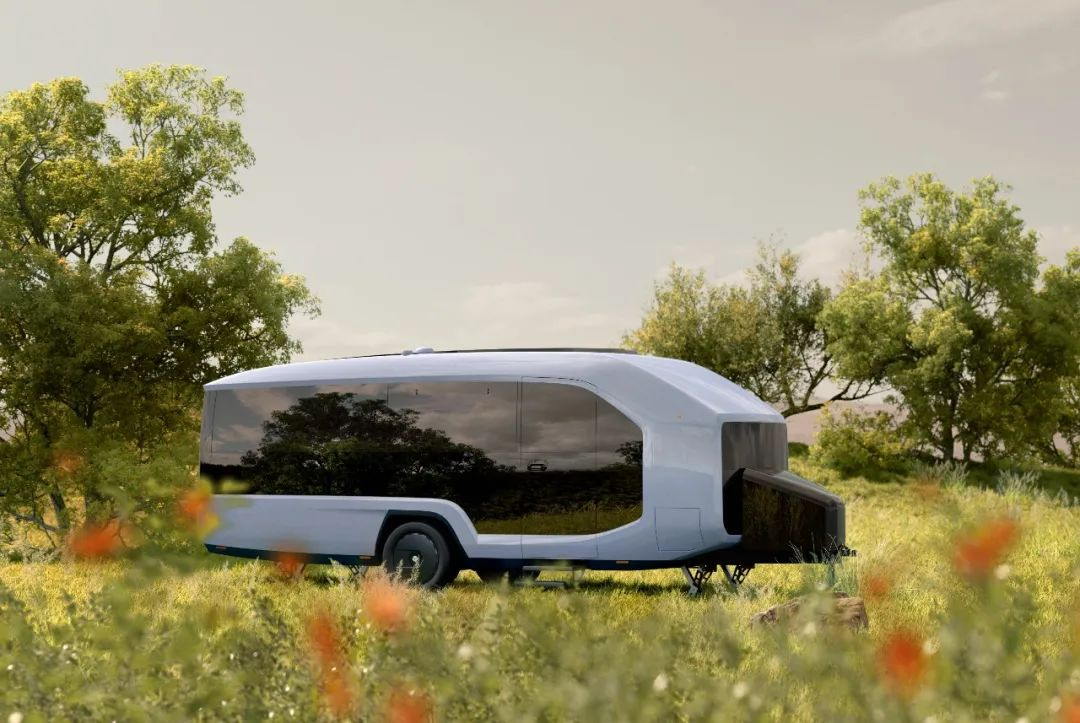There really is a motorhome that is highly compatible with the ideal “high-speed rail”. A motorhome startup company called Pebble recently officially launched a smart trailer motorhome called Flow. It looks like this:
Unlike typical travel trailers, the Pebble Flow has a very modern appearance and, most importantly, it is very intelligent. It is an all-electric travel trailer with auxiliary drive, solar panels, and batteries, which can be used for outdoor camping, as an office, study room, or even as an emergency power source at home. The company’s founder has an impressive background, having been a senior executive at Apple, and the team also includes employees from companies such as Tesla, Lucid, and Zoom. It is believed that in the near future, we will truly see the “bullet train” pulling another “bullet train”. The company, named Pebble, is a real new force, founded in 2022, with the goal of completely automating the “most difficult parts” of RV life. As their first flagship product, Pebble has spared no effort, stating that this trailer will be the “iPhone of the RV world,” just as Apple pioneered the era of smartphones, they also want to pioneer the era of smart RVs. The biggest difference between this trailer and others is that users can control various functions of the vehicle through a mobile app, and even achieve automatic driving, although currently only available for iPhone users. Owners only need to download the dedicated Pebble Flow app. Once connected to the vehicle, you can control most of the facilities on the vehicle, such as awning retraction, electric steps, all vehicle lights, door locks, parking air conditioning, and parking jack leveling.
Expanding or retracting awnings, stairs, and lights is nothing new, but what Pebble is most proud of is the ability to control the mobile home through a smartphone. With just a tap on your phone, the Pebble Flow can maneuver out of tight spaces, making it easier for the car to tow, similar to the current parking assist function. It can also automatically dock, locate and align with the towing vehicle’s hook, then use a specialized computer vision system and robot algorithm to complete the connection, officially known as “Magic Hitch,” with an accuracy of 2-3 centimeters. With the ability to move on its own, the vehicle must have a power source. Pebble Flow is the world’s first trailer with a dual motor traction system, equipped with two hub motors and a 45kWh power battery.
According to the plan, this motorhome will be delivered in 2024. If delivered as scheduled, they will be the first company to market this technology. According to the official introduction, Pebble Flow can also achieve functions similar to autonomous driving. Users only need to click the button on the application to follow behind the towing vehicle and adjust according to road conditions and traffic rules. However, Pebble has not yet demonstrated the detailed features of automatic following.
In addition, when the tractor or other equipment needs to be charged, the 45kWh power battery on board becomes a backup emergency power source, providing power for all the appliances in the motorhome and displaying the remaining power and charging time.
Pebble claims that, combined with solar panels and regenerative braking, Flow can run on stored electricity for up to a week off the grid. Even without power, its regenerative braking system can charge itself when being towed. With solar panels, Flow has become a blessing for new energy vehicles. While being towed by a car, it can rely on its own power system to provide some power to assist in towing, thereby reducing the energy consumption of the vehicle.
Even more impressive is its ability to automatically adjust the air suspension, air conditioning, heating, and other equipment in different climates and terrains through an intelligent adjustment system. The Flow is approximately 7.62 meters long, 2.64 meters high, and 2.28 meters wide. It features smoother lines, black and white color treatments on the front, sides, and rear, and a “cyberpunk” vibe. It also includes enclosed wheel rims and through-type taillights. The front section is designed in a bullet head style, which connects seamlessly with the rear of the tractor to effectively reduce the drag coefficient when towing. According to the official information, its aerodynamic performance is three times that of traditional trailer RVs. The part of the front end resembling a high-speed train head is called the Active Aero front nose cone by Pebble. It automatically raises during towing to improve driving aerodynamics and lowers when parked, revealing a glass with a 270-degree view.
The layout of the current RV is similar to the interior of a car, with a convertible U-shaped seating area, kitchen, separate wet and dry toilet, and a double bed from front to back. The kitchen is equipped with removable stove, refrigerator, and microwave, and the bed area can also be transformed into an L-shaped sofa and work table through “room flipping”.
Of course, with such a smart RV, the price won’t be low. Pebble said that the starting price for Flow is $109,000, with a higher-end version priced at $125,000. It’s worth noting that the $109,000 model is just standard, with the dual-wheel hub motor and various self-moving functions only available in the $125,000 high-end version. Also, your vehicle must have a towing capacity of at least 2.8 tons. When a startup company says they want to disrupt an industry that’s just entering, they’re usually not taken seriously, but Pebble is different. In June 2023, just six months after its establishment, Pebble received its first round of funding, announcing that it had raised $13.6 million from institutions such as Lightspeed, Yuanjing Capital, UpHonest Capital, and CCV. It’s not hard to see that there are many Chinese capital behind this round of financing, with Lightspeed having also invested in Hesai Technology. Interestingly, the opportunity that led to this financing was Lightspeed founder Mi Qun being introduced to the company by Hesai Technology co-founder and CEO Li Yifan. The reason why these investment institutions are paying attention to a startup company that’s less than a year old is not only the product, but also the team behind the company, which is an important factor for them to consider.
Bingrui Yang, founder and CEO of Pebble, worked at Apple for 9 years, leading the design and development of the touch/display system modules for the entire iPhone series products. After leaving Apple, Bingrui Yang started working for the self-driving car company under Amazon’s Zoox, leading hardware development, and then worked at Cruise under General Motors, leading all hardware development and integration of self-driving cars. With his career background, he is definitely a big shot in the tech industry. Bingrui Yang himself is a camper enthusiast, and he founded a camper company after a camper trip at the beginning of the pandemic in 2020. He believes that consumers have been confined to a monotonous camper experience, and many people want to live a free lifestyle, but often the products are not up to par, leading to a significant decrease in happiness.
In general, RVs are heavy and not smart, making towing difficult. As many SUVs or pickups switch from fuel cars to electric cars, towing traditional RVs will reduce the established driving range by about one-third to half, resulting in a very poor user experience. So, he decided to simplify the most complicated part of the RV experience based on the high-tech new energy vehicles in the automotive industry, making the entire RV travel easier. In his words, “If you know how to use an iPhone, you can handle our product.”
Based on this concept, Pebble was born. Not only that, but he also brought in another automotive technology expert to form its founding team – Stefan Solyom, currently serving as Pebble’s Chief Technology Officer. He was a founding member of Tesla’s autopilot team and also worked at Apple for 7 years, and served as a senior technical expert in safety and autonomous driving systems at Volvo for 10 years. With over 20 years of experience in the automotive and technology industries. In addition to Yang Bingrui and Solyom, many other members of Pebble’s team also come from companies such as Tesla, Lucid Motors, Cruise, Zoox, and Apple. A technical team composed of former elites from various companies was formed just like that. Also a former Apple executive, currently serving as a consultant for Pebble, Dave Rosenthal said, “At Pebble, I can see the influence of the ‘Apple culture.'” The product is indeed cool, but the price is also quite high. With a price of 800,000 to 900,000, you can buy three Xiaopeng G6s or two NIO ES7s. Would you pay for this product?
